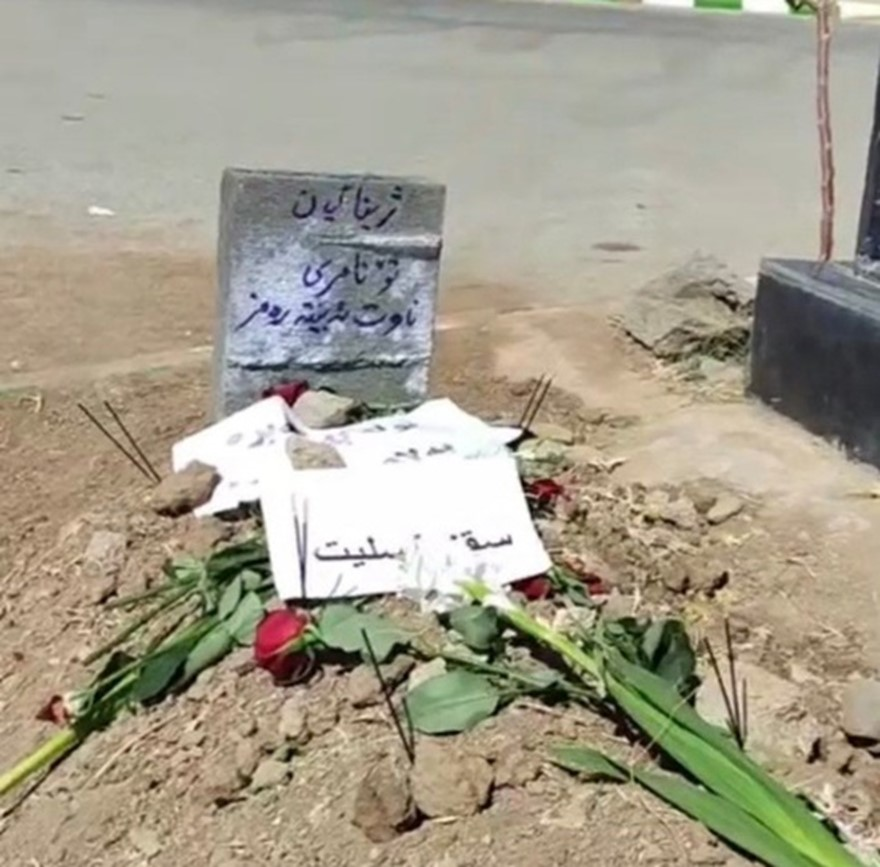
“Jîna giyan, to namirî, nawit ebête remiz” (“Jina, my soul. You won’t die. Your name will become a symbol”), these are the Kurdish words engraved on Jina Amini’s gravestone by her family,[1] a few days before she became the national symbol of the revolution against the Islamic Republic of Iran.
Threats To Jina Amini’s Family
On September 17, hours after Amini’s funeral in her hometown Saqqez, thousands of Kurds poured into the streets across Eastern Kurdistan (Iranian Kurdistan), from where the protests spread across the country, with people burning pictures of the Iranian Supreme Leader Ali Khamenei and chanting “Death to the dictator.”[2]
In its report published on October 7, Iran’s Forensic Organization denied that Jina Amini had died due to blows to the head and limbs while in the custody of Iran’s morality police and linked her death to pre-existing medical conditions.[3] Amini’s family and her lawyer, however, rejected the coroner’s report and held the police responsible for their daughter’s death, stating that Jina had been in “perfect health.” Amjad Amini, the father of Jina, added: “I saw with my own eyes that blood had come from her ears and the back of her neck.”[4] Since the beginning of the protests, Jina’s family has received death threats and has been warned not to get involved in the demonstrations.[5]
Death Toll Rises
As anti-regime revolution continues, Iran has intensified its violent crackdown on protestors. Forty days after the tragic death of Jina, at least 252 people, including 35 children, have been killed and over 13,300 arrested in the ongoing anti-Iranian regime protests, the Human Rights Activists News Agency (HRANA), a news site run by a collective of Iranian human rights advocates, said.[6] In Zahedan city in Balochistan alone, Iranian security forces massacred at least 82 Baloch protestors on September 30, 2022, widely referred to by Iranians as “bloody Friday.”[7]
The Islamic Republic Blames The U.S., Israel And Kurds For The Unrest
In his first remarks addressing the death of Jina Amini, Ayatollah Ali Khamenei said that her death “deeply broke” his “heart.” Talking about the unrest that followed her death, Khamenei stated: “I openly state that the recent riots were schemes designed by America, the fake Zionist regime and their mercenaries inside and outside Iran.”[8]
“On September 16, minutes after the death of Mahsa Amini in Tehran’s Kasra Hospital, two CIA agents got into her room and took the first photos of her,” Iranian lawmaker Amirabadi Farahani claimed in a televised interview, adding that “the 2022 popular protests have all been pre-planned.”[9]
Another official in charge of investigating Amini’s death, speaking to Iran’s news channel SNN, repeated similar accusations that some weeks prior to the Jina Amini’s death, three CIA agents had met with Kurdish officials in the Kurdistan Region of Iraq, planning to instigate unrest in Iran particularly in the Kurdish region in Northwestern Iran. The suspicious death of a Kurdish woman in Tehran, he claimed, was part of this pre-planned scenario.[10]
The 40th Day After The State Murder Of Jina
Amini’s hometown Saqqez has been the sight of relentless protests and a general strike since September 17, 2022. It is worth noting that the Norway-based Kurdish human rights NGO, Hengaw Organization for Human Rights, reported that, a day before the 40th day after the state murder of Jina, her family had been under a lot of pressure from the Iranian security agencies to issue a statement regarding halting the ceremony marking 40 days since her death. Her relatives and brother have also been threatened with arrest.[11]
Yet, large numbers of people came from all Eastern Kurdistan to Saqqez to be there for the anniversary of her death. Among them were renowned athletes, artists, and writers. In Saqqez, the hotels were full, and many locals opened their homes to host the protesters. The forces of the Islamic Republic met them with large forces in and around the city, as all the entrances to the city and the roads leading to Aichi Cemetery, which is located five kilometers from Saqqez city, were blocked.[12]
Despite the threats and the security forces’ blockade, on October 26, thousands of people managed to reach the cemetery, even by going through water channels, and assembled at Amini’s grave, chanting “Death to the Dictator”, “Jin, Jiyan, Azadi (a Kurdish slogan meaning “Woman, Life, Freedom” used as the rallying cry of the Iranian protests),” and “Kurdistan will stand, as long as a Kurd is alive.”[13]
Conclusion
On the 40th day after the state murder of Jina, it is our duty to pay justice to her memory and to who she was. Jina was forced to live as “Mahsa” during her life, as the Islamic Republic of Iran does not accept the registration of Kurdish names in official documents, thus, cancelling her identity. After her death, let us give her back her Kurdish name, as it resonated today all-around Eastern Kurdistan, becoming the sound of the revolution against the Islamic Republic of Iran. On this day, the mother of Jina wrote on her social media account: “I wish you were here and saw that there is a world named after you, called Jina. Your name has become famous.”[14]
